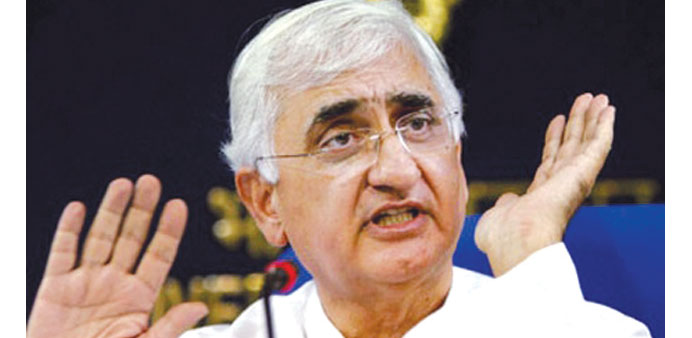|
External Affairs Minister Salman Khurshid yesterday defended the vast US surveillance programme of phone logs and Internet data revealed by intelligence leaker Edward Snowden. |
“Some of the information they got out of their scrutiny, they were able to use it to prevent serious terrorist attacks in several countries,” Khurshid told reporters in Brunei in a broadcast interview.
“This is not scrutiny and access to actual messages. It is only computer analysis of patterns of calls and e-mails that are being sent... it is not actually snooping on the content of anyone’s messages or conversations,” he added.
The comments by Khurshid, who met US Secretary of State John Kerry in New Delhi last month, contrast with India’s initial reaction when a foreign ministry spokesman warned that any privacy violation would be “unacceptable.”
Khurshid is attending an Asean security forum in Brunei, along with Kerry and regional foreign ministers.
“I don’t think we should be raising it to such a high level...that it becomes a matter of serious question. It is only a computer study of patterns - meaning destination. It is not snooping,” Khurshid said.
“There are issues that America is looking at. We discussed it during Kerry’s visit. Kerry and (US President Barack) Obama have clarified, there is some information that they get out of scrutiny and they use it for terrorism purposes.”
He said India and the US have a cyber security dialogue during which such issues are discussed.
“As far as we are concerned there are no issues at stake,” he added.
Telecom Minister Kapil Sibal said the “government is looking at what is the nature of information being sought, and let the external affairs ministry first find that out.”
Information and Broadcasting Minister Manish Tewari cast doubts on the veracity of the revelations of US cyber snooping and said the Indian government should be allowed to study the report and take a “holistic view” on the issue.
“Since these are revelations which are coming from an individual, they are really hearsay, it is not as if this is verified information that is being put in the public space. We also need to see the other aspect of it as to how seriously should we take unverified content,” Tewari told Times Now news channel.
“I think we should allow government to formulate a holistic view. We will apply ourselves to whatever has been written in those communications so that the government can take a holistic view as to how best to respond to it,” he said.
Tewari said the matter does raise some issues which not only pertain to access of data in an authorised or an unauthorised manner but also to the larger questions of diplomatic immunity of communications and sanctity of the Geneva Convention protocols which are involved.
Based on documents provided by Snowden, The Guardian newspaper reported at the weekend that US intelligence services were also spying on 38 embassies and diplomatic missions of its allies including India.
Snowden, whose US passport has been cancelled, remains holed up in Moscow airport where he has sought asylum from 21 countries.
Meanwhile, the Communist Party of India (Marxist) urged the government to lodge a strong protest against the US snooping activities directed at India and demand its immediate halt.
“The government should have strongly protested against such surveillance and bugging,” the CPM said in a statement.
“Instead, it is shocking that External Affairs Minister Salman Khurshid has sought to justify the snooping by stating that ‘It is not snooping. It is only computer study and computer analysis of patterns of calls’.
“India has a foreign minister who is not worried that the Indian embassy in Washington is bugged by the US intelligence agency.
“This shameful remark has come at a time when even the close allies of the US like Germany and France have protested against the US snooping on their countries.”

